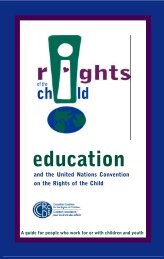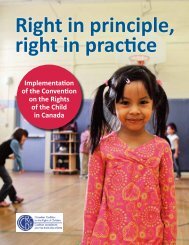Poste - Canadian Coalition for the Rights of Children
Poste - Canadian Coalition for the Rights of Children
Poste - Canadian Coalition for the Rights of Children
Create successful ePaper yourself
Turn your PDF publications into a flip-book with our unique Google optimized e-Paper software.
The House <strong>of</strong> Commons Standing Committee on<br />
Citizenship and Immigration recommended that new<br />
detention guidelines <strong>for</strong> immigration <strong>of</strong>ficers be<br />
implemented to foster consistency across <strong>the</strong> country; and<br />
that detention should be imposed only if <strong>the</strong> guidelines<br />
have been carefully followed, and only as a last resort<br />
after <strong>the</strong> possibility <strong>of</strong> conditional release has been<br />
carefully considered and rejected. 101<br />
Detention Facilities<br />
There are three regional detention facilities <strong>for</strong> refugees:<br />
<strong>the</strong> Celebrity Inn in Toronto, <strong>the</strong> Skyline Hotel in<br />
Vancouver and <strong>the</strong> Laval Centre in Quebec. The<br />
<strong>Canadian</strong> Council <strong>for</strong> Refugees has recommended that<br />
<strong>the</strong> “Act should establish some minimum standards <strong>for</strong><br />
<strong>the</strong> conditions <strong>of</strong> detention.” 102 The House <strong>of</strong> Commons<br />
Standing Committee on Citizenship and Immigration<br />
visited <strong>the</strong> sites. It found that <strong>the</strong> Celebrity Inn lacked<br />
sufficient indoor common space; had “a dreary, small”<br />
outdoor area; had inadequate facilities where children<br />
could play; did not seem “particularly clean”, and had<br />
“less than desirable” air quality. The Committee said that<br />
<strong>the</strong>re was a need <strong>for</strong> uni<strong>for</strong>m conditions in immigration<br />
detention centres and that <strong>the</strong>se should be modelled on<br />
<strong>the</strong> Quebec facility. 103<br />
Health, Education and<br />
Settlement Services<br />
Access to Health Care<br />
Health care is under provincial jurisdiction and each<br />
province and territory has its own health insurance or<br />
medical care protection legislation. Refugee claimants<br />
who are not eligible <strong>for</strong> provincial health coverage rely<br />
on <strong>the</strong> Interim Federal Health Program.<br />
In provincial statutes o<strong>the</strong>r than Quebec, Convention<br />
refugees who are residents <strong>of</strong> a province are entitled to<br />
health care services in that province. Refugee claimants<br />
in Quebec no longer have access to services provided by<br />
<strong>the</strong> Minister <strong>of</strong> Health and Social Services but are<br />
eligible <strong>for</strong> emergency services paid <strong>for</strong> by <strong>the</strong> Interim<br />
Federal Health Care program, as well as primary and<br />
emergency services available through <strong>the</strong> Service d’aide<br />
aux immigrants et réfugiés de Montréal Métropolitan, a<br />
semi-public organization affiliated with <strong>the</strong> Centres des<br />
loisirs et services sociaux. 104 Since 1996, persons waiting<br />
to be granted refugee status and those who have had <strong>the</strong>ir<br />
H O W D O E S C A N A D A M E A S U R E U P ?<br />
113<br />
request refused no longer have access to health insurance<br />
programs, hospitalization insurance or health<br />
assistance. 105<br />
Until October 1995, La Régie de l’assurance maladie du<br />
Québec (RAMQ) systematically issued health insurance<br />
cards to minors born in Canada to parents who resided in<br />
Quebec but who were ineligible <strong>for</strong> <strong>the</strong> RAMQ coverage.<br />
In November 1995, RAMQ decided that <strong>the</strong>se children<br />
were no longer eligible. The federal government agreed<br />
to provide <strong>the</strong>se children with emergency care coverage<br />
under <strong>the</strong> Interim Federal Health Care program. 106<br />
Access to Free Primary and Secondary<br />
Education<br />
Education is under provincial jurisdiction and each<br />
province and territory has its own education or school<br />
act. School attendance is compulsory <strong>for</strong> children aged<br />
five, six or seven (depending on <strong>the</strong> jurisdiction) to age<br />
16. This includes Convention refugee children and<br />
children <strong>of</strong> a parent or guardian who has been determined<br />
to be a Convention refugee.<br />
There are special Immigration Act provisions (Section<br />
10; Regulations ss. 14.1, 14.2, 14.3, 15 and 16) <strong>for</strong><br />
refugee claimants and <strong>the</strong>ir dependants to attend school:<br />
<strong>the</strong>y will be issued a student authorization if <strong>the</strong>y have<br />
been found eligible to have <strong>the</strong>ir refugee claim heard in<br />
Canada and <strong>the</strong>ir claim has been referred to <strong>the</strong><br />
Immigration and Refugee Board. There is conflicting<br />
in<strong>for</strong>mation from Toronto groups about whe<strong>the</strong>r or not<br />
schools prevent children from attending schools until<br />
<strong>the</strong>ir authorization paper has been issued.<br />
In Quebec, access to free primary and secondary<br />
education is provided <strong>for</strong> child refugees, children<br />
claiming refugee status and <strong>for</strong> those who have<br />
unsuccessfully claimed refugee status but whose presence<br />
in Quebec is still legal. This applies to all children<br />
between <strong>the</strong> ages <strong>of</strong> four and 16 years (or up to <strong>the</strong> age <strong>of</strong><br />
18 or 21, if <strong>the</strong> child has disabilities). 107<br />
Financial Assistance<br />
For government-sponsored refugees, financial assistance<br />
is provided through <strong>the</strong> Adjustment Assistance Program<br />
to pay <strong>for</strong> temporary accommodation, necessary clothing<br />
and household effects, and living expenses <strong>for</strong> up to one<br />
year or until <strong>the</strong> newcomer is self-supporting. 108 Since<br />
1996, this program has also provided income support to




